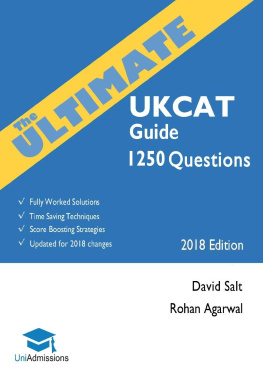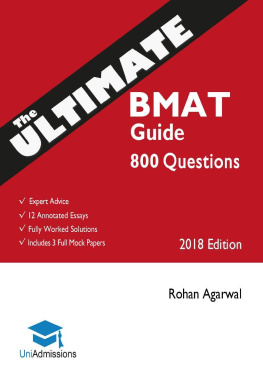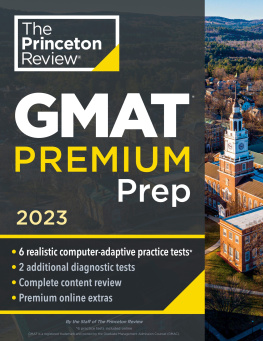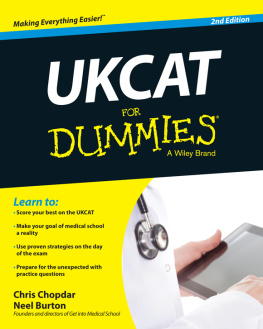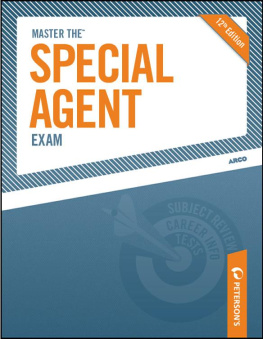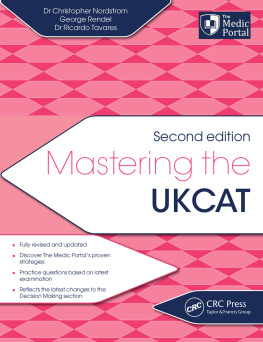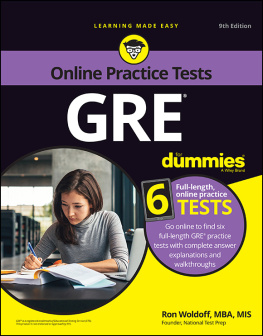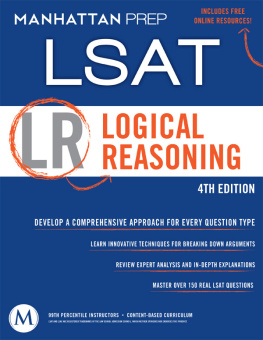TABLE OF CONTENTS
The Ultimate UKCAT Guide
Copyright 2017 UniAdmissions . All rights reserved.
rd Edition
ISBN 978-0-9935711-2-1
No part of this publication may be reproduced, stored or transmitted in any form or by any means, electronic or mechanical, including photocopying, recording, or by any information retrieval system without the prior written permission of the publisher. This publication may not be used in conjunction with or to support any commercial undertaking without the prior written permission of the publisher.
Published by RAR Medical Services Limited
www.uniadmissions.co.uk
Tel: 0208 068 0438
This book is neither created nor endorsed by UKCAT. The authors and publisher are not affiliated with UKCAT. The information offered in this book is purely advisory and any advice given should be taken within this context. As such, the publishers and authors accept no liability whatsoever for the outcome of any applicants UKCAT performance, the outcome of any university applications or for any other loss. Although every precaution has been taken in the preparation of this book, the publisher and author assume no responsibility for errors or omissions of any kind. Neither is any liability assumed for damages resulting from the use of information contained herein. This does not affect your statutory rights.
The Ultimate UKCAT Guide
1250 Practice Questions
Dr David Salt
Dr Rohan Agarwal
About the Authors
David is Director of Services at UniAdmissions , taking the lead in product development and customer service. David read medical sciences at Gonville and Caius College Cambridge, graduating in 2012, completed his clinical studies in the Cambridge Clinical School and now works as a medical doctor.
David is an experienced tutor, having helped students with all aspects of the university applications process. He has authored five books to help with university applications and has edited four more. Away from work, David enjoys cycling, outdoor pursuits and good food.
Rohan is the Director of Operations at UniAdmissions and is responsible for its technical and commercial arms. He graduated from Gonville and Caius College, Cambridge and is a fully qualified doctor. Over the last five years, he has tutored hundreds of successful Oxbridge and Medical applicants. He has also authored ten books on admissions tests and interviews.
Rohan has taught physiology to undergraduates and interviewed medical school applicants for Cambridge. He has published research on bone physiology and writes education articles for the Independent and Huffington Post . In his spare time, Rohan enjoys playing the piano and table tennis.
THE BASICS
What is the UKCAT?
The United Kingdom Clinical Aptitude Test (UKCAT) is a two hour computer based exam that is taken by applicants to medical and dental schools. The questions are randomly selected from a huge question bank. Since every UKCAT test is unique, candidates can sit the UKCAT at different times. There is a three month testing period and you can sit the test anytime within it.
You register to sit the test online and book a time slot. On the day, bring along a printout of your test booking confirmation and arrive in good time. Your identity will be checked against a photographic ID that youll need to bring. You then leave your personal belongings in a locker and enter the test room. Make sure you go to the toilet and have a drink before going in, to save wasting time during the test.
Who has to sit the UKCAT?
You have to sit UKCAT if you are applying for any of the universities that ask for it in the current application cycle. You are strongly advised to check this list in May to see if the universities you are considering require it. The following is a list of the universities and courses requiring the UKCAT for 2018 entry. As it is subject to change, it is included for guidance only:
The following table gives the subject area for each of the course codes that require UKCAT.
Why is the UKCAT used?
For medical schools, choosing the best applicants is hard. Every year, medical schools are flooded with talented applicants, all of whom have top grades and great personal statements. They felt they needed extra information to help them find the very best from the pool of very talented applicants they always had. Thats why admissions tests were created.
The UKCAT was first introduced in 2006 to help medical schools make their choices. The test examines skills in different areas, all of which are related to critical thinking and decision making. The idea was to create a pure aptitude test, something which cannot be prepared for. However this is certainly not the case with the UKCAT, and this is even acknowledged by UKCAT itself based on their research. In our experience, you can improve your UKCAT score with only a small amount of work, and with proper organised preparation the results can be fantastic.
When do I sit the UKCAT?
When you register to sit UKCAT online, you choose your date and time slot and also the test centre. The UKCAT can be sat from 3 rd July through to early October. Registration for the test opens in early May we recommend you book your test early so you have the best choice of possible dates.
Many students find it helpful to sit UKCAT in mid-late August this gives you time in the summer to prepare, but gets the test complete before you go back to school, so you have one less thing to worry about at that busy time. Remember that you may want to modify your university choices based on your UKCAT score to maximise your chances of success.
How much does it cost?
In the EU, tests sat between 3 July and 31 August cost 65. Tests sat between 1 September and 3 October cost 85. Tests outside the EU cost 115 throughout the testing period.
Some candidates who might struggle to fund the UKCAT fee are eligible for a bursary. If eligible to apply for one, you need to apply with supporting evidence by the deadline of 21 September 2017.
Can I re-sit the UKCAT?

